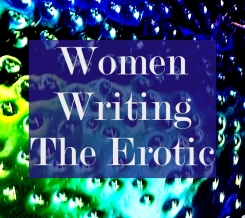 In this series (within the 130 authors survey), I’ll be sharing women’s views on exploring sexuality through fiction.
In this series (within the 130 authors survey), I’ll be sharing women’s views on exploring sexuality through fiction.
Which themes tug to be unravelled and explored?
What motivates us, challenges us, empowers us – as readers and as writers?
Women are not only the predominant readers of erotica but form the lion’s 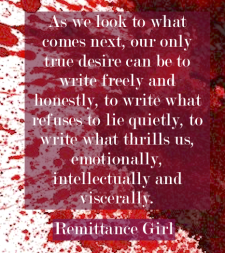 share of authors, and our voices are growing louder.
share of authors, and our voices are growing louder.
More of us than ever are letting rip on the page, opening our sexual imagination. As we know, when it comes to erotic fantasy, it’s more fun when you’re sharing.
Women continue to face battle after battle for equal rights, respect and recognition, across every sphere imaginable, but when it comes to erotic fiction, our feet are firmly under the table.
Perhaps, just perhaps, we’re stepping into an age where we’ll have the freedom to read (and write) what we damn well like: within the pages of erotic fiction, and beyond.
In her interview with The Paris Review, Ursula K. Le Guin nailed it in saying: ‘Don’t shove me into your damn pigeonhole, where I don’t fit, because I’m all over. My tentacles are coming out of the pigeonhole in all directions.’
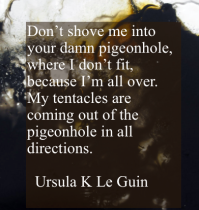 There’s still a degree of censorship, and traditional publishers remain somewhat cautious about stepping outside of the box, but, if we keep writing up against the boundaries, inch by inch, they will surely come down.
There’s still a degree of censorship, and traditional publishers remain somewhat cautious about stepping outside of the box, but, if we keep writing up against the boundaries, inch by inch, they will surely come down.
As Remittance Girl notes, on her website manifesto: ‘As a woman, I have inherited the burden of thousands of years of social, religious and sexual oppression. My understanding of self, my agency, my language and my sexuality were born, molded and twisted by that oppression. I am happy to have a discussion on why I write what I write, but I will not tolerate being told what I can or cannot write about.’
Brantwijn Serrah admits to considering using a pseudonym for her first title outside of the genre, believing that preconceptions exist as to who can write what. She asserts, “Erotica, being conceived as a subgenre of romance, seems to be the realm deemed most appropriate for women to write, while adventure, fantasy and science fiction appear to be realms reserved for men. The perception that women are good for sex while men are the ones trusted with more “serious” business is an offensive and disappointing reality.”
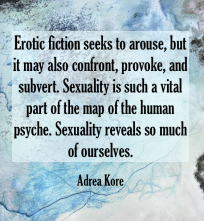
Remittance Girl comments, “Erotica can be breathtakingly beautiful because it’s about us at our most naked, our most vulnerable. It is an exposure of both our passions and our hideous flaws. Our destructive jealousy, our brittle pride, our hunger for what doesn’t belong to us, our need for the strange and the transgressive.”
I’m keen to see men embracing erotica too: sending a big cheer to all men writing and reading sexually-themed stories (read more about male authors of erotic fiction here). However, when women write ‘the erotic’ it makes my heart sing.
Some would argue that gender is irrelevant to how we approach the page as writers, that we have the ability to portray any human being, from any time in history, and from anywhere. All that’s needed is imagination.
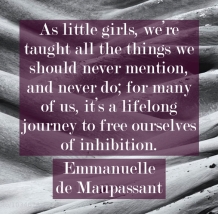 It’s true that some elements of the human condition are universal. We all, surely, know what it is to love, to despair, to smile, or to regret. We know the fragility of life and we share wonder in the world we inhabit.
It’s true that some elements of the human condition are universal. We all, surely, know what it is to love, to despair, to smile, or to regret. We know the fragility of life and we share wonder in the world we inhabit.
And yet, as women, aren’t we best placed to portray what it’s like to walk in our skin?
Double-standards, Repression and Censorship
As little girls, we’re taught all the things we should never mention, and never do; for many of us, it’s a lifelong journey to free ourselves of inhibition.
Adrea Kore reminds us, “Women writing and speaking about their own desire, being open with what gives them pleasure and turns them on … even finding the words for that is something that is still seen as taboo in corners of Western culture, let alone in comparison to cultures where women are more repressed ideologically, and socially.”
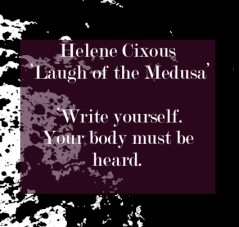 As Cecilia Tan states, “I was put on Earth to write but it wasn’t until I started writing erotic fiction that I found my voice. I want a world where sexual freedom, not sexual oppression, is the norm, and so I write about sexual pleasure and fulfillment.”
As Cecilia Tan states, “I was put on Earth to write but it wasn’t until I started writing erotic fiction that I found my voice. I want a world where sexual freedom, not sexual oppression, is the norm, and so I write about sexual pleasure and fulfillment.”
Ina Morata comments, “Sex is the medium I use to investigate psychological boundaries: my personal insecurities and fears. I explore who I am and see how far I can push myself. Erotica, more than any other genre I have worked in, allows me to do this without feeling contained or isolated.”
Adrea sees erotica writing, particularly as a female author, ‘as a political act 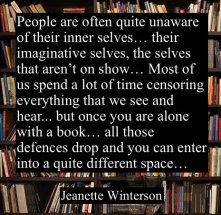 as well as a creative one’. She explains, “French feminist Helene Cixous phrased it beautifully in an essay called ‘Laugh of the Medusa’ – ‘Write yourself. Your body must be heard.’ I think this applies to all women’s stories, but particularly those around sexuality. The political aspect of it, the desire to confront and subvert, is a strong motivation for me – as strong as the desire to seduce and arouse.”
as well as a creative one’. She explains, “French feminist Helene Cixous phrased it beautifully in an essay called ‘Laugh of the Medusa’ – ‘Write yourself. Your body must be heard.’ I think this applies to all women’s stories, but particularly those around sexuality. The political aspect of it, the desire to confront and subvert, is a strong motivation for me – as strong as the desire to seduce and arouse.”
Brantwijn Serrah notes that her focus is on women’s pleasure and the satisfaction of ‘the sexual spirit we are programmed, as women, to suppress or deny’. She notes, “When I write from a male point of view, I’m aware of the disparity, the ‘privilege’ of men to express sexual interest while women still struggle with this.”
Lily Harlem explains that she loves to write heroines who ‘break the rules’, but laments 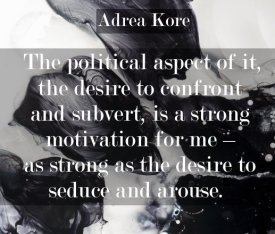 that some readers have criticized her writing of female protagonists who lack ‘the same moral compass’ as themselves. She notes, “I call these cardboard cut out heroines. From my personal experience, people make crazy decisions when it comes to love and passion.” She asserts that ‘flawed, impulsive, manipulative heroines’ breathe life into fiction.
that some readers have criticized her writing of female protagonists who lack ‘the same moral compass’ as themselves. She notes, “I call these cardboard cut out heroines. From my personal experience, people make crazy decisions when it comes to love and passion.” She asserts that ‘flawed, impulsive, manipulative heroines’ breathe life into fiction.
Elizabeth Safleur underlines, “Men and women are still pressured to conform to certain standards. What’s odd is how hypocritical those standards can be. Be attractive! Be Sexy! Attract a mate! Yet, not too much. The minute anyone takes full ownership of their attractiveness, sexuality and relationships, they are deemed too aggressive or too [insert negative label of choice]. Both men and women fall under pressure, albeit differently, to conform to others’ ideas of what is acceptable. I can’t help but tell these stories because I see (and have experienced) the cost of burying yourself and your sexual urges under layers of ‘I shouldn’t be like this’ or ‘I shouldn’t want this’. I hope people find kindred spirits in my characters.”
Writing Beyond Conventions
Almost half of the authors responding to the 130 Authors survey mentioned, to some degree, discontent with formulaic, restrictive expectations and publishing ‘rules’.
Shanna Germain asserts that she wants readers to ‘question assumptions’. She explains, “I like to give people a slant-mirror. Not a perfect reflection of themselves, but a could-be reflection.”
Nya Rawlyns adds, “Much of what passes for erotica today feels stale, too often reflecting romance tropes. Lust and desire, needs and wants… all have consequences. I’m interested in how an individual changes under conditions of denial or when personal and other boundaries are smashed.”
Similarly, Jade A Waters states, “Sex is transformative. I tend to take my characters on journeys of discovery, often as an echo of something I’ve learned in my own life.”
Erotica lends itself well to exploration of ‘grey areas of morality’, as Tobsha Learner calls them: to the small lies we tell ourselves, and to the ways in which we manipulate or make use of others.
Adrea Kore emphasizes, “Erotica writes into areas of the human sexual psyche and behaviour that some genres gloss over or shy away from. Erotica brings into the light contradictions between our inner sexual desires and our outward behaviour. What do we secretly long for, and to attain that, what lengths would we go to?” (more here)
In particular, 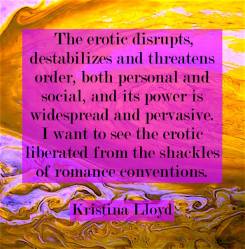 some authors mention a desire to explore the realm of non-consent.
some authors mention a desire to explore the realm of non-consent.
Christina Mandara laments, “I love non-consensual elements in erotica but the world at large has decided that this isn’t acceptable. It seems that women, particularly, must have consensual, hearts and flowers stories.”
Kristina Lloyd feels similarly that there is potential to explore ‘the erotic’ beyond the ‘shackles of romance conventions’.
As Anne Rice notably stated in The Guardian newspaper (2012), erotica writers seek freedom to explore. With particular reference to women, Ms. Rice states: ‘As a feminist, I’m supportive of equal rights for women, and that includes the right of every woman to write her sexual fantasies and to read books filled with sexual fantasies that she enjoys. The whole world knows women are sensual human beings as well as men. It’s no secret anymore that women want to read sexy fiction just as men do, and there’s a new frankness about the varieties of fantasies one might enjoy. So many cliches have been broken and abandoned. And this is a wonderful thing.”
Sorcha Black believes that many books named as ‘too graphic or taboo’ are those aimed at women. She underlines, “The policing of women’s sexuality still includes censoring what we read.”
Malin James asserts that her writing of erotic elements wasn’t a ‘conscious decision’ but that she began to feel stifled by avoiding sexual themes. She notes, “It stifled my work and, as a writer, that sort of self-censorship was discouraging and unproductive. Censorship is a complicated issue and to 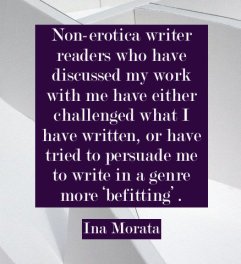 preoccupy myself with it as I write would be to stymie the story before it’s even formed. While I acknowledge the reality of censorship, I try not to let it, or fear of it, influence my writing. I serve the story. If it trips censors, so be it. I have the luxury of pulling it and sending it elsewhere.“
preoccupy myself with it as I write would be to stymie the story before it’s even formed. While I acknowledge the reality of censorship, I try not to let it, or fear of it, influence my writing. I serve the story. If it trips censors, so be it. I have the luxury of pulling it and sending it elsewhere.“
KD Grace voices a view raised by a significant number of those who took part in the ‘130 authors’ survey: the lack of respect for the erotic fiction genre in the literary world. Ina Morata echoes this, saying that writers outside of the erotic fiction genre have challenged her, asking why she doesn’t write in a genre more ‘befitting’.
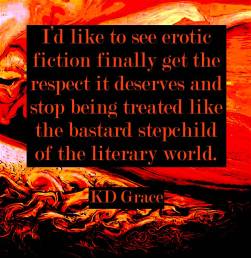 However, KD Grace stresses that this generates an attitude of ‘us against the world and circle the wagons’ and ‘a real sense of camaraderie among erotica writers (with little of the petty jealousy I’ve seen among writers in some other genres).’ She feels the erotica writing community as ‘a family’, saying, “That encouragement has meant a lot to me through the years.”
However, KD Grace stresses that this generates an attitude of ‘us against the world and circle the wagons’ and ‘a real sense of camaraderie among erotica writers (with little of the petty jealousy I’ve seen among writers in some other genres).’ She feels the erotica writing community as ‘a family’, saying, “That encouragement has meant a lot to me through the years.”
Writing Women’s Sexuality
Adrea Kore remembers being in her mid-twenties, studying feminism and theatre, and dating a poet, when she discovered Adrienne Rich’s poem ‘In My Rose-wet Cave’. She recalls the image, of ‘being underwater, and yet botanical. Fragrant and secret. Hidden away, deep-hued and moist’. She tells us, “I was intrigued and delighted. And I began to search for more of this kind of writing, that could re-invent the feminine body, the feminine experience of 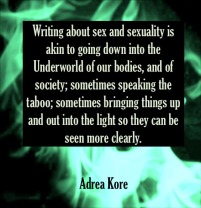 desire. I think it put light on the seed already in me to find new and evocative ways of writing about feminine desire and describing the desiring female body.”
desire. I think it put light on the seed already in me to find new and evocative ways of writing about feminine desire and describing the desiring female body.”
Tabitha Rayne notes that writing erotic fiction, ‘felt like discovering a new colour‘. “I couldn’t stop expressing myself in the erotic. It was like opening a door to myself,” she asserts.
Donna George Storey tells us, “When I got the courage to start writing again as an adult (after getting my B.A. in creative writing and then taking a long writing break as I felt I had nothing interesting to say), all the stories that came out had to do with sexuality. I still find the erotic experience the one 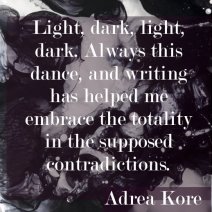 thing that truly inspires me to silence the inner critic and just write and enjoy the pleasure of speaking the unspeakable.”
thing that truly inspires me to silence the inner critic and just write and enjoy the pleasure of speaking the unspeakable.”
Susan St. Aubin comments, “I’m interested in the mystery of human life, and sex is a big part of that, perhaps the thing that most illuminates the mystery.”
Rose Caraway, speaking of her work in audio narration of erotic fiction, tells us, “Together, we’re helping people awaken, at their own pace. Each story narrated acknowledges sexuality, our own and others’, because it’s being read aloud. Those words want to be heard, making us stronger, so that we can better express and own our sexuality.” (more from Rose here)
Adrea notes her fascination with ‘feminine experience of the world’ and stories ‘of growth, transformation and dislocation, felt through and mediated by the body’. She explains, “These were the things that I began to write about: Love and longing. Loss. Translating the physical arts I most loved into words: my experiences of dancing and life-modelling. Then, more arduously, carving out narratives of sexual trauma. Death. Then, the sensual pleasures. Sex. Light, dark, light, dark. Always this dance, and writing has helped me embrace the totality in the supposed contradictions.” (read more on this topic from Adrea here)
Kristina Lloyd relates this to her own journey, saying, “Through writing, I’ve learned so much about my own sexuality and desire. Writing has given me an understanding; it has allowed me to own a sexuality I’d been conflicted about and confused by when I was younger.”
Emerging Changed
Remittance Girl tells us that ‘all fiction carries the traces of its author’. She asserts, “The difference between really good writing and mediocre writing is not when the characters emerge changed, but when you know, as a reader, that the author has also emerged changed.”
In writing, we gain greater understanding of our motivations, our pleasures 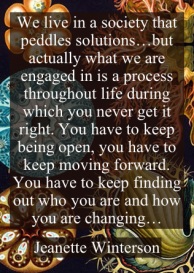 and our fears. We emerge changed and, as RG tells us, we ‘expose something true’ of ourselves (more here).
and our fears. We emerge changed and, as RG tells us, we ‘expose something true’ of ourselves (more here).
Adrea Kore adds, “Language and ideas, once encountered, live inside you, and can effect changes, both subtle and catalytic. Words endure. And the feelings they conjure up in the body can endure too, leaving traces, imprints in the cells, the memory.” (more here)
Write your own truths, write your own pages.
Our voices are here to be heard.
READ ON – Women Writing the Erotic: Part Two and Part Three
Women authors tell us what compels them to write in the erotic genre, including the themes which refuse to lie quietly, their influences and inspirations, and the relevance of gender to their work.
You may also be interested to read:
- First Inspirations
- Why Write Erotic Fiction?
- Fantasy and Realism and Erotic Fiction
- Lines in the Sand: transgression and censorship
- Hidden Identities: writers of erotic fiction
- What the Future Holds: 21st century erotic fiction
- Publishing’s Dirty Secret
Also coming soon…
Writing Craft
Authors’ Recommended Reads
Author Influences: theatre, music, art, film, fiction, dance
Among the women writers taking part in the 130 Authors survey were:
Laura Antoniou, Susan St. Aubin, Shanna Germain, Remittance Girl, Malin James, Janine Ashbless, Adrea Kore, Tobsha Learner, Kristina Lloyd, Cecilia Tan, Donna George Storey, Kathe Koja, Justine Elyot, Sorcha Black, Cari Silverwood, Siri Ousdahl, Zander Vane, Tamsin Flowers, Krissy Kneen, Zak Jane Keir, Jade A Waters, KD Grace, Kay Jaybee, Nya Rawlyns, Sessha Batto, Rose Caraway, Tabitha Rayne, Elizabeth Safleur, Devi Ansevi, K. L. Shandwick, I.G. Frederick, Jacqui Greaves, Ina Morata, Elsa Holland, Elizabeth Schechter, Lucy Felthouse, Alexis Alvarez, Lily Harlem, Madeline Moore, Ria Restrepo, Scarlet Darkwood, Victoria Bliss, Jane Gilbert, Charlie Powell, Cate Ellink, Lee Savino, Elizabeth Black, Felicity Brandon, Nicolette Hugo, Amelia Smarts, Sue MacNicol, Cassandra Shaw, Ardent Rose, Sylvia Storm, Renee Rose, Rachel de Vine, Cherry Wild, Patient Lee, Pandora Spocks, Suzette Bohne’ Sommers, Molly Synthia, Meg Amor, Lizzie Ashworth, Cara Bristol, Finn Marlowe, C.A. Bell, Brantwijn Serrah, Aubrey Cara, Kathleen Bradean, Stormchase, Lisa Fox, Allyson Young, Emma Jaye, Dee Maselle, Christina Mandara, Sue Lyndon, Rebecca Branch, Molly Moore, Vanessa Wu, Jaye Peaches, Ashe Barker, Tilly Andrews and Catherine Mazur.
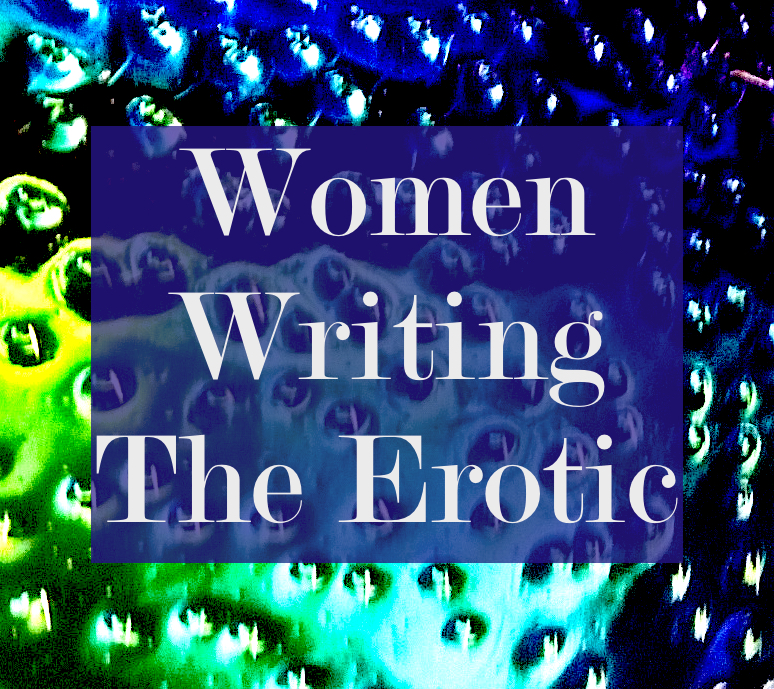
What a fascinating and much needed post! Bravo!
Thank you Sooz
This survey inspires me over and over.
Thank you for the affirmations. I’ve had 2 books tagged and removed this week and it’s shaken my confidence. I am reminded I am not alone and that the voices of women’s sexuality are rising little by little in unity.
How infuriating Sophie. I’m so sorry to hear that. You are NOT alone.
Keep following your inspiration. Keep sending out the words.
x
Thank for for this, adding many new names to my list.
Perfect.
I agree: much inspiration here.
Another Great piece!
Reblogged this on sashaholden1 and commented:
Women and erotica
Another excellent article culling from the survey results, and rounded out by insightful commentary.
Thank you Devi xxx
Loving this survey series that you’re doing. XoXo
Thank you Mischa xx
I love it too.